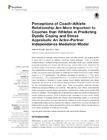Perceptions of coach–athlete relationship are more important to coaches than athletes in predicting dyadic coping and stress appraisals: an actor–partner independence mediation model
Citation
Nicholls AR and Perry JL (2016) Perceptions of Coach–Athlete Relationship Are More Important to Coaches than Athletes in Predicting Dyadic Coping and Stress Appraisals: An Actor–Partner Independence Mediation Model. Front. Psychol. 7:447. doi: 10.3389/fpsyg.2016.00447

View/
Date
2016Author
Perry, John
Nicholls, Adam R.
Peer Reviewed
YesMetadata
Show full item record
Nicholls AR and Perry JL (2016) Perceptions of Coach–Athlete Relationship Are More Important to Coaches than Athletes in Predicting Dyadic Coping and Stress Appraisals: An Actor–Partner Independence Mediation Model. Front. Psychol. 7:447. doi: 10.3389/fpsyg.2016.00447
Abstract
Most attempts to manage stress involve at least one other person, yet coping studies in sport tend to report an athlete’s individual coping strategies. There is a limited understanding of coping involving other people, particularly within sport, despite athletes potentially spending a lot of time with other people, such as their coach. Guided by the systemic-transactional model of stress and coping among couples (Bodenmann, 1995), from relationship psychology, we assessed dyadic coping, perceptions of relationship
quality, and primary stress appraisals of challenge and threat among 158 coach–athlete dyads (n D 277 participants). The athletes competed at amateur (n D 123), semiprofessional (n D 31), or professional levels (n D 4). Coaches and athletes from the same dyad completed a measure of dyadic coping, coach–athlete relationship, and stress appraisals. We tested an Actor–Partner Interdependence Mediation Model to account for the non-independence of dyadic data. These actor–partner analyses revealed
differences between athletes and coaches. Although the actor effects were relatively large compared to partner effects, perceptions of relationship quality demonstrated little impact on athletes. The mediating role of relationship quality was broadly as important as dyadic coping for coaches. These findings provide an insight in to how coach–athlete dyads interact to manage stress and indicate that relationship quality is of particular importance for coaches, but less important for athletes. In order to improve perceptions of relationship quality among coaches and athletes, interventions could be developed to foster positive dyadic coping among both coaches and athletes, which may also impact upon stress appraisals of challenge and threat.
Keywords
DyadsRelationships
Systemic-transactional model
Coping
Threats
Challenges

